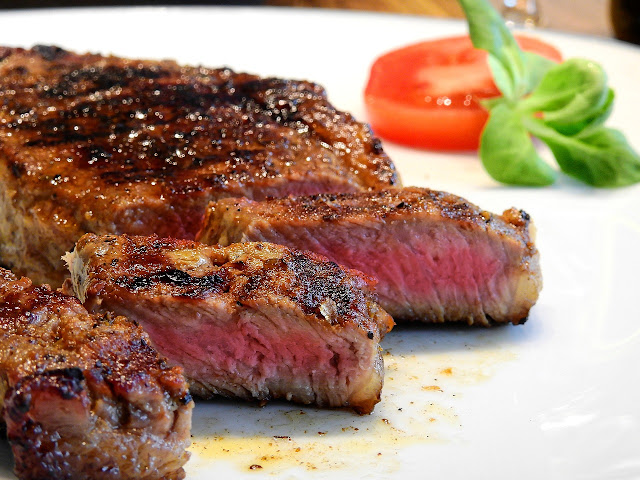A good tasting steak require quality raw material and an
experienced chef. The meat is well cut, trimmed, spiced and cooked right. Make
sure the place is spotless and present top notch service.
A good steakhouse has a welcoming ambiance offers
entertainment and serve great food. The business also requires lots of
enthusiasm, hard work and attentive staff. It should have proper branding,
equipment and an effective marketing strategy.
How
to Start a Steakhouse Restaurant
There are three ways to start a steakhouse restaurant.
The person can start from scratch, purchase an existing one or join a
franchise.
A franchise will provide draining, branding and support.
However starting from scratch or buying an existing one offers autonomy. Before
buying an existing one hire an accountant to determine their financial
liabilities and reason for sale.
Ways
to Start a Steak Restaurant
• Start from
scratch
• Purchase
an existing one
• Join a
franchise
The first step is to write a steakhouse business plan.
Then carry out a feasibility study to find an ideal location. The plan should
have the mission statement, strategic vision and goals.
A good plan shows the viability of the business, short comings
while making make provisions for expansion. Study the competitor’s business
structure, customer base, menu and prices.
Learn
the Trade
The business is capital and labor intensive. The
entrepreneur needs to hire qualified chefs to create enticing menus.
Running a restaurant involves more than meals such as
accounting, marketing and inventory management. Seek advice from steakhouse
owners in distant locations for better insight on challenges.
Carving
a Niche
Steakhouses are very popular in America and they attract
a fair share of the restaurant industry. This type of establishment are usually
small–medium sized independent businesses.
Their core specialty is serving delicious steak to
patrons. The steaks are grilled, steamed, cooked or fried depending on the
menu. To succeed the entrepreneur needs to carve a niche in a highly contested
and competitive market.
Carving a niche requires high quality meat, good
location, appropriate equipment and competitive prices. The restaurant should
present a great dining experience and welcoming ambiance.
Branding
To differentiate the business from the competition
branding is important. Register a business name and create an impressive logo.
Make sure the core service is evident in the name. To
create a compelling logo hire an expert to create one. The name must be
original and different from those obtained in the industry.
Pricing
It is mandatory to serve quality meat at a reasonable
price. Deliver a good dinning experience that meets customer expectations is
the secret to success.
To offer quality meat the steakhouse needs to network
with quality meat providers to source the raw material. The difference in taste
is attributed to flavoring, curing and good recipes. It is important designing
a menu that customers appreciate.
Staffing
The staff is pivotal to the success of the enterprise.
Therefore hire only qualified chefs, cooks and servers. Some establishments
have live music and entertainment.
Hire cleaners, drivers, casher and backroom receptionist.
The staff should be trained to accommodate the mission and vision of the
restaurant.
Sourcing
The main raw material is the steak and ingredients that
accompany the meal. It is important buying only premium meat from accredited
suppliers.
Good inventory management is mandatory to avoid
overstocking and waste. Overstocking would create money loss and reduce the
quality of the steak.
Steakhouse Restaurant Equipment
The list of equipment needed to run a restaurant is huge.
Apart from the obvious equipment such as dishes, cups, cutlery and furniture.
There are common supplies needed for the successful running of the
enterprise.
We have kitchen wares, furnishing, large kitchen
equipment, service items. Others are linen, bar supplies, dishes and glass cups
flatware
Supplies
Bar supplies are ice bins bar tender equipment, mats,
trays, cups. Linen includes quality tablecloths, napkins and blinds. While
service supplies are register, bus tubs, carts, aprons and trays. Dining room
furniture include wooden tables, bar stools, chairs.
Restaurant
Supplies
• Mats
• Trays
• Cups
• Tablecloths
• Napkins
• Blinds
• Cash
register
• Bus tubs
• Carts
• Aprons
• Trays
• Wooden
tables
• Bar stools
• Chairs.
Large
Kitchen Equipment
Large Kitchen equipment are used for cooking, grinding,
cutting, cooking and grilling. More are walk-in freezer, knives, chef
equipment. Cutting boards, blenders, food processors, coffee maker. We have
utensils, racks, sheet pans, cooking pots and oven.
Commercial
Restaurant Equipment
• Walk-in
freezer
• Knives
• Chef
equipment
• Cutting
boards
• Blenders
• Food
processors
• Coffee
maker
• Utensils
• Racks
• Sheet pans
• Cooking
pots
• Oven
Location
Find a location with lots of human and vehicular traffic.
Popular locations for restaurants are commercial areas, intersections or close
to corporate clients. The restaurant should be visible, approachable and
inviting. Make sure the shop has large dinning space, storage and parking.
Funding
Conduct a comprehensive market research and write a
business plan. Fund through personal savings, partnership or investors.
Approach a bank or join a corporative to secure startup
loan. The cost of starting a small steakhouse ranges from $20,000 to $200,000.
Marketing
The business is lucrative and highly competitive. Use
flyers, posters, billboards and banners to attract patronage. Take out
newspaper advertisement, radio or television ads. Build a website to highlight
the services and use social media marketing.
How to write truck stop business-plan
How to write a Tea Room Business Plan
How to Write a Bakery Business Plan
How to write truck stop business-plan
How to write a Tea Room Business Plan
How to Write a Bakery Business Plan











0 comments:
Post a Comment